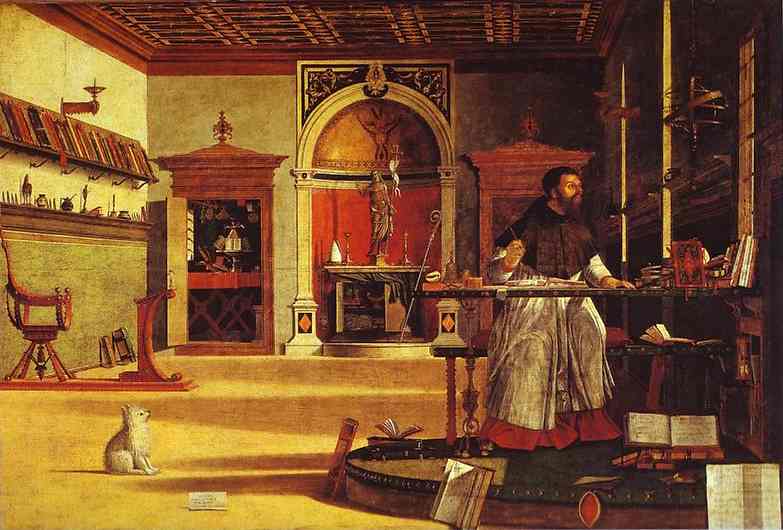
D.A. Carson Lecture on the Scholar-Pastor
D.A. Carson gave lecture in April (2009) on being a scholar-pastor. I thought it was very good. Here is a link to the lecture: http://www.desiringgod.org/resource-library/conference-messages/the-scholar-as-pastor=
Just scroll down a bit.
- Details
- Category: Recommended Reading Recommended Reading
- Published: 16 November 2009 16 November 2009
- Hits: 6429 6429
The Need for New Tastebuds

Actually the problem is deeper than tastebuds, but sometimes new words can perhaps jar us into thinking about certain things. For Christians of a traditional sort, it can be tempting to think of the lordship of Christ, the life of following in Christ in terms of stamping out desires instead of transforming desires. As I have read Augustine over the years, I have always been struck by how central "desire" is for his thinking. For Augustine God does not squelch desire in general, although desire is central both to the problem and the solution of human existence, sin, and misery (and happiness!). Since for Augustine all persons are caught up in Adam's transgression, we have--to put it plainly--disordered loves or desires. We both love and desire the wrong things, but we also at times love the right thing the wrong way. Our "tastes" are satisfied when they should not be (as C.S. Lewis says in "The Weight of Glory"--we are much too easily satisfied). What we need are new tastebuds (the problem is deeper--perhaps we need to become brand new persons, tastebuds and all). In terms of desire and tastes, Augustine writes this in To Simplicianus: "The price of deadly pleasure includes the sweetness which deceives, and gives delight in doing contrary to the law, which is all the more pleasant the less it is lawful. No one can enjoy that sweetness as the price of his condition without being compelled to serve lust as chattel-slave. He who knows that an act is prohibited and rightly prohibited, and yet does it, knows that he is the slave of an overmastering desire" (To Simplicianus, I, First Question, 7).
- Details
- Category: Recommended Reading Recommended Reading
- Published: 15 November 2009 15 November 2009
- Hits: 3467 3467
There May be a Reason Scripture Can be Difficult to Understand

I have had the joy of spending a lot of my fall reading Augustine. As always, Augustine is virtually an endless well. Augustine suggests that there is a reason Scripture is hard to understand, and that it takes work to interpret Scripture--this is the providential working of God. Augustine writes: "This [i.e., the difficulty of understanding and interpreting Scripture] is all due, I have no doubt at all, to divine providence, in order to break in pride with hard labor, and to save the intelligence from boredom, since it readily forms a low opinion of things that are too easy to work out" (from Augustine's On Christian Doctrine II.6.7).
- Details
- Category: Recommended Reading Recommended Reading
- Published: 14 November 2009 14 November 2009
- Hits: 3248 3248
Alasdair MacIntyre and the Nature of the Intellectual Life

I am always thankful when senior scholars continue to write and produce. And it is always a treat when a senior scholar is able to summarize significant material in a relatively succinct way. Witness: Alasdair MacIntyre's recent God, Philosophy, Universities: A Selective History of the Catholic Philosophical Tradition (Rowman and Littlefied, 2009). These lectures are based on a popular course MacIntyre has taught at Notre Dame for some time. Ralph Wood has shared in his notes on his sabbatical at Notre Dame that at the end of the semester the students in MacIntyre's class gave him a standing ovation! MacIntyre has thought long and hard on these issues, and there is much in this book that Christians (including Protestants) can learn from. There is much one might cull from this book. MacIntyre recognizes that all true learning must ultimately deal with certain key questions (in one way or another). And one of the key question is--what does it mean to be human? He writes, "any adequate account of what it is to be a human being will explain how and why human beings are capable of the relevant kind of self-knowledge. Such an account will have to integrate what we can learn about the nature and constitution of human beings from physicists, chemists, and biologists, historians, economists, and sociologists, with the kind of understanding of human beings that only theology can afford" (177).
- Details
- Category: Recommended Reading Recommended Reading
- Published: 26 October 2009 26 October 2009
- Hits: 3177 3177